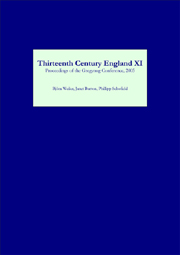Book contents
- Frontmatter
- Contents
- LIST OF ILLUSTRATIONS
- PREFACE
- CONTRIBUTORS
- ABBREVIATIONS
- ‘Adam of Bristol’ and Tales of Ritual Crucifixion in Medieval England
- Ethics and Office in England in the Thirteenth Century
- Some Aspects of the Royal Itinerary in the Twelfth Century
- The minority governments of Henry III, Henry (VII) and Louis IX compared
- Scottish Queenship in the Thirteenth Century
- Ethnicity, personal names, and the nature of Scottish Europeanization
- Power, Preaching and the Crusades in Pura Wallia c.1180–c.1280
- A Forgotten War: England and Navarre, 1243·4
- The Appointment of Cardinal-deacon Otto as Legate in Britain (1237)
- Matthew Paris and John Mansel
- The Burial of Noblewomen in Thirteenth-Century Shropshire
- Dynastic Conflict in thirteenth-century Laxton
- Absenteeism: The Chronology of a Concept
Absenteeism: The Chronology of a Concept
Published online by Cambridge University Press: 12 September 2012
- Frontmatter
- Contents
- LIST OF ILLUSTRATIONS
- PREFACE
- CONTRIBUTORS
- ABBREVIATIONS
- ‘Adam of Bristol’ and Tales of Ritual Crucifixion in Medieval England
- Ethics and Office in England in the Thirteenth Century
- Some Aspects of the Royal Itinerary in the Twelfth Century
- The minority governments of Henry III, Henry (VII) and Louis IX compared
- Scottish Queenship in the Thirteenth Century
- Ethnicity, personal names, and the nature of Scottish Europeanization
- Power, Preaching and the Crusades in Pura Wallia c.1180–c.1280
- A Forgotten War: England and Navarre, 1243·4
- The Appointment of Cardinal-deacon Otto as Legate in Britain (1237)
- Matthew Paris and John Mansel
- The Burial of Noblewomen in Thirteenth-Century Shropshire
- Dynastic Conflict in thirteenth-century Laxton
- Absenteeism: The Chronology of a Concept
Summary
There is no doubt that the origins of the English words ‘absentee’ and ‘absenteeism’ are to be found in the pages of Irish history. The question to be pursued here is how far back into that history the search for the beginnings of a developed consciousness of English ‘absenteeism’ and its effects upon the lordship of Ireland should be pushed. Writing in the opening decades of the twentieth century, Goddard Henry Orpen set out to correct ‘the strong tendency amongst Irish writers to assume that nothing but evil resulted to Ireland from Anglo-Norman rule’. In arguing thus Orpen was swimming against the tide of events, or at least their propaganda, for in 1916 and 1919 proclamations had been made renouncing 700 years of foreign usurpation. Orpen felt that Irish writers had ‘in mind the troubled history of Ireland in much later times’ when they considered what he referred to as the Anglo-Norman era. It likewise seems plausible that in dealing with lords who held land in Ireland but who resided elsewhere, the judgement of some historians has been coloured by the criticisms of absentee landlords of the eighteenth and nineteenth centuries. Not only was absenteeism inherently bad news, or ‘evil’ to use the word favoured by Edmund Curtis, but it began to be bad news from an early date.
Several historians have located this early date in the mid thirteenth century with the coincidence of two key events: the grant of Ireland to the lord Edward in 1254 and the division of the great lordship of Leinster among female heiresses who were married to English lords.
- Type
- Chapter
- Information
- Thirteenth Century England XIProceedings of the Gregynog Conference, 2005, pp. 215 - 229Publisher: Boydell & BrewerPrint publication year: 2007



